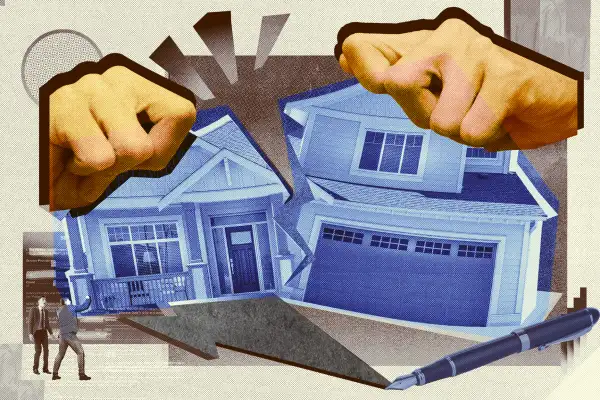5 Reasons Home Sales Keep Falling Through — and How Sellers Can Prevent It

A few months ago, buyers would do just about anything to snag a home. Now, they’re reneging on deals at the highest rate seen in years.
That’s right: According to real estate brokerage Redfin, over 15% of home purchase agreements in August fell through — up from just 12% a year ago and the second-highest point on record (it was 17% in the early months of the pandemic).
The trend is even worse in some cities. Jacksonville, Florida, is seeing more than 26% of its home sales fall through, and Las Vegas, Atlanta, Orlando and Fort Lauderdale aren’t far behind.
“Buyers just aren’t willing to deal with issues right now,” says Phillip Salem, a real estate agent with Compass in New York.
Really, it’s a myriad of factors driving this trend, but Salem’s words are a good way to sum things up. Buyers feel more emboldened — not to mention more cautious — than they have in a long time.
Victoria Staten, a hopeful home seller in Minnesota, has seen this phenomenon first-hand (twice, in fact). When Staten listed her 4,000-square-foot Minneapolis home in early September, she had buyer interest from the get-go.
“During the ‘coming soon’ phase, I had seven offers — all well over the asking price,” says Staten, a home designer and owner of remodeling firm The Upside Chicago. “I accepted the highest offer.”
Staten assumed the deal was done, but within days, the buyer backed out due to issues found in the inspection (a few items were not up to current building code). Another buyer quickly swooped in, only to back out, too. “We went through it again,” she says. “Same scenario.”
Earlier this year, a few repairs wouldn’t have been a dealbreaker. Today, though, the market’s changing. While initially, Staten had hoped to fix the home up and relist it, as the Minnesota winter closed in and pricey workers, supply chain shortages and inflation compounded matters, she decided to pivot. She opted to sell the property to a local investor earlier this week.
More and more sellers are experiencing the same whiplash of a quickly changing market. What’s behind this trend and what can sellers do to stop it? Here’s what industry pros had to say.
1. Higher mortgage rates
At the top of the list are rising mortgage rates, which have significantly eroded affordability for today’s homebuyers. Since the start of the year, the average rate on 30-year mortgage loans has surged from 3.22% to nearly 7% — a number not seen in over two decades.
The result has been skyrocketing monthly payments that have quickly slipped out of reach for many shoppers. According to Realtor.com, payments on a median-priced home are now up over 70% compared to a year ago — or about $900 more per month.
“Rates are volatile and have everything to do with the pullback,” says Rachel Black-Johnson, a real estate agent with CENTURY 21 Gavish in Las Vegas. “Buyers are priced out of the market, because the cost to borrow money is a lot higher than it was just a few months ago.”
The term “volatile” is key here. Rates haven’t just jumped considerably; they’ve made notable moves in both directions in a very short period of time. From July to September, rates went from 5.70% down to 4.99% and then up to 6.70% — from trough to peak, a difference of $437 per month on a $400,000 house.
“Mortgage rates have moved very rapidly higher this year and have had several weeks where moves were up or down by more than a quarter-point in just one week,” says Danielle Hale, chief economist for Realtor.com. “This kind of volatility can impact the math for home shoppers. An offer that a buyer put on a home that seemed comfortable may no longer be manageable when rates rise suddenly.”
Hale says rate jumps are particularly impactful for first-time homebuyers, who often make smaller down payments, borrow more money and have smaller budgets.
They also make a big difference for new construction buyers. According to John Burns Real Estate Consulting, 17.6% of home builder contracts fell through in July — more than double the rate seen just months prior. In Texas, a whopping 27% of new home contracts were canceled.
With new home purchases, buyers often sign their sales contracts months in advance — well before they can lock their mortgage rates and solidify a monthly payment. By the time the home is nearing completion, rates could have increased significantly, putting its payment out of reach completely.
“The purchase contracts that were written for new homes getting ready to close today may have been written 12 months ago or more,” says Walt Danley, founder and president of Walt Danley Christie's International Real Estate.
And 12 months ago? Rates were barely over 3%.
2. Economic uncertainty
The overall economy — and general uncertainty about its direction — is also playing a role in canceled deals. In fact, real estate pros say buyers are increasingly voicing concerns about a looming recession, future job losses and the possibilities of a housing crash (which most experts don’t expect to happen).
All in all, they say, it’s caused more trepidation among buyers.
“Uncertainty is a word I keep hearing,” says Jessie Hoff, broker-owner at CENTURY 21 JRS Realty in Rahway, New Jersey. “The concerns about affordability, the expectation of unemployment eventually increasing and, in general, the concern that buyers might be near or at the end of the strong market — and therefore paying top-dollar when maybe it’s not needed any longer — has certainly contributed to some buyers pulling back and walking away mid-transaction.”
Dennis Shirshikov is one such buyer. He put in an offer on a Greene, New York home this summer — only to back out at the last minute due to economic concerns and rising mortgage rates, which had just started creeping past 5%.
“The impending recession and rising rates signaled that we might be buying at the top of the market,” says Shirshikov, a strategist for real estate investment platform Awning.
Shirshikov lost his $2,000 earnest money deposit for pulling out, but the decision ultimately worked out in his favor. While he wasn’t able to find a lower-priced property in the meantime, the sellers of that original home — unable to find a replacement buyer — recently reached out with a new proposition: Buy the home for $10,000 less and call it even.
Shirshikov accepted, closing on the property just this week. “The $10,000 made a difference,” he says.
3. More contingencies and pricier repairs
A few months ago, contingencies — essentially “out” clauses for homebuyers — were basically a non-starter. Bidding wars were so common, and demand was so high that sellers simply didn’t need to accept offers that could potentially fall through.
“A lot of buyers stayed in deals that were less than optimal for them because they needed to buy a house and the sellers held all of the cards,” Danley says. “If a buyer threatened to cancel a contract because of an issue they discovered during the inspection period, the seller would say ‘Go ahead and cancel. We have 15 other people who will take your place.’"
Now, the supply and demand balance has changed. Buyers have leverage, ushering in a new age of contingency-laden deals.
As Sebastian Vallejo, managing broker at Brown Harris Stevens in Miami Beach, puts it, “Contingencies are back.” According to Realtor.com, 92% of recent sellers accepted “buyer-friendly terms,” and 41% accepted at least some contingencies, which allow the buyers to back out due to inspection findings, a low appraisal or an inability to get approved for a mortgage.
“Buyers are no longer overly optimistic and bullish about the market,” Vallejo says. “They are cautious about being locked in at a high interest rate combined with a high property price, so they are requesting all contingencies to be included.”
Inspection contingencies are particularly useful these days, as the costs of construction materials, contractors and other home services rise. Inflation and supply chain delays are giving buyers pause when inspections reveal problems.
“With home prices and mortgage rates high, today's homebuyer budgets are very likely stretched thin,” Hale says. “They may not have the wiggle room to make repairs that a home inspection shows are needed.”
4. Investment losses
The stock market has been notoriously volatile in recent months, and Americans have seen their 401(k)s, IRAs and investment portfolios shrink significantly as a result. According to the Federal Reserve, the country’s lost over $9 trillion in total wealth since the start of the year.
For some consumers, those losses are largely retirement-related, so there’s time (hopefully) to build the stores back up. Others, particularly luxury buyers, though, were counting on those investment accounts to fund a more immediate home purchase.
Real estate broker Baron Hanson recently had clients in this boat. They’d been on the market for a new vacation home for about six months and planned to use their investment portfolio to fund the deal.
Hanson helped them tour over 100 homes and even found two properties that were perfect — not to mention under budget. Unfortunately, it wasn’t enough to combat a quickly sinking stock market.
“They had lost so much money in the market that their $2 million Florida vacation home budget vanished into thin air,” says Hanson, who works with Coldwell Banker in Stuart, Florida. The pair have since backed off buying a new property entirely.
5. Hope that there’s a better house (or price) out there
As buyers have pulled back, the number of for-sale listings has increased. In September, total active housing inventory jumped 27% annually, while the average time on market stretched to 50 days — a full week longer than last year.
It's given way to a much more buyer-friendly market, where shoppers have more choices, more time and, finally, more leverage.
“Home shoppers have more options than they had one year ago which may shift their willingness to negotiate with sellers,” Hale says. “If sellers don’t budge when negotiating contract terms, buyers may be more likely to explore other options.”
On top of this, there’s also the hope of lower prices. The median listing price has declined steadily month-over-month since June, and price reductions have become much more common. More than 19% of listed homes saw a price cut in September.
As buyers see these changing market conditions, many can be tempted to back out of existing deals, hoping for better prospects on the horizon.
“Many buyers felt pressured to up their bids on a home just a few months ago and sign contracts on homes that didn’t quite suit them,” says Mihal Gartenberg, an agent with Coldwell Banker Warburg in New York. “If a buyer notices that current home prices have fallen significantly, they may take the hit, lose their contract deposit and even their preferential mortgage rate and decide to keep looking for a home that better suits their budget and needs.”
What sellers can do to stop it
So, buyers are pulling out — and there’s a lot behind it. But what can sellers do about it? Should they drop their prices starkly and hope buyers bite? Pull back and avoid the market altogether?
Agents say there are actually less-drastic measures that can help. First, be up front about any potential issues the property may have. This prevents inspection surprises.
“Once a buyer receives their inspection report, it will show any major and minor items that need repairs,” says Carolina Gerdts, executive vice president at RelatedISG Realty. “By disclosing any known fact from day one, you avoid entering a contract that might fall apart.”
Being willing to negotiate is critical, too. Make the buyer’s requested repairs, or offer credits to cover them, and be flexible about your closing timeline. You can even offer to buy down the buyer’s interest rate (a popular option these days) or include extras to sweeten the deal.
“Negotiation is key right now,” Salem says. “Get creative. Include furniture — given furniture orders are so backed up — or provide credits at closing for bathroom or kitchen renovations. You can even have your agent do the work on getting quotes for renovations so the buyers know a rough range of how much something will cost to reno or fix.”
Finally, adjust your expectations and price the home appropriately — meaning for today’s market, not the one your neighbor sold a few months ago.
As Salem explains, “Agents can do everything and anything possible to get people in the door, but ultimately a buyer will not submit an offer unless the home is priced according to market conditions right now.”
More from Money:
Why the Fall Housing Market Won't Be Great for Buyers — or Sellers
The Fed Says the Housing Market Needs a 'Correction.' What Does That Mean?
10 Cities Where Home List Prices Have Dropped the Most Since June


